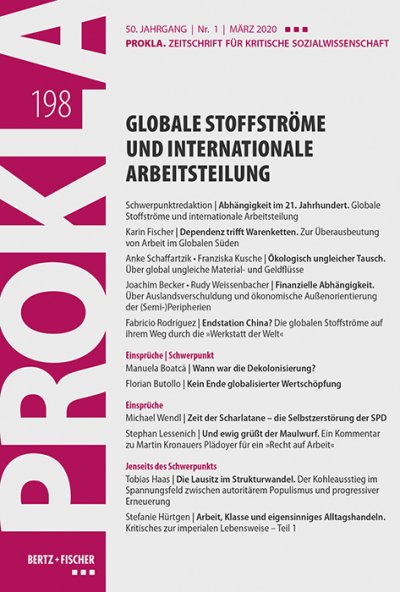Endstation China?
Die globalen Stoffströme auf ihrem Weg durch die „Werkstatt der Welt“
DOI:
https://doi.org/10.32387/prokla.v50i198.1857Schlagworte:
China, Stoffströme, Material Flow Accounting and Analysis, materieller Fußabdruck, Weltsystem, Raw Material Consumption, International Resource PanelAbstract
Aus einer Perspektive der Weltsystemtheorie diskutiert der Artikel, inwieweit sich China von einem Durchflusszentrum für globale Materialströme zu einem Zielland mit erhöhtem Materialverbrauch entwickelt. Der Artikel verwendet das Konzept der Material Flow Accounting and Analysis (MFA), um empirische Daten des Internationalen Ressourcenpanels zu analysieren. Die Ergebnisse zeigen, dass China zu einem immer wichtigeren Wirtschaftsraum wird, der die USA und die EU in seiner Bedeutung als Endstation des Materialverbrauchs sogar übertrifft. Gleichzeitig behauptet China weiterhin seine Position als zentrale Drehscheibe in den globalen Materialflüssen, wobei der Binnenmarkt im Vergleich zu den externen Märkten kontinuierlich und gleichzeitig expandiert.
Downloads
Literaturhinweise
Butollo, Florian (2014): The end of cheap labour? Industrial transformation and »social upgrading« in China. Frankfurt/M.
Cardoso, Fernando Henrique / Faletto, Enzo (1970): Dependência e desenvolvimento na América Latina. Ensaio de interpretação sociológica. Rio de Janeiro.
Cheng, Leonard K. (2016): Three questions on China’s »Belt and Road Initiative«. In: China Economic Review 40(C): 309–313. DOI: https://doi.org/10.1016/j.chieco.2016.07.008.
China Power Team (2019): How well-off is China’s middle class? CSIS China Power Project. URL: https://chinapower.csis.org/china-middle-class/, Zugriff: 12.3.2019.
Conrad, Sebastian / Randeria, Shalini (2013): Einleitung: Geteilte Geschichten - Europa in einer postkolonialen Welt. In: Conrad, Sebastian / Randeria, Shalini / Römhild, Regina (Hg.): Jenseits des Eurozentrismus. Postkoloniale Perspektiven in den Geschichts- und Kulturwissenschaften. 2., erw. Aufl. Frankfurt/M-New York: 32–70.
EIA, U.S. Energy Information Administration (2015): China. International energy data and analysis. Washington, DC.
EU Kommission (2019): Gemeinsame Mitteilung an das Europäische Parlament, den Europäischen Rat und den Rat. EU-China. Strategische Perspektiven. Straßburg. URL: https://ec.europa.eu/commission/sites/beta-political/files/communication-eu-china-a-strategic-outlook_de.pdf, Zugriff: 11.3.2019.
Gao, Yuning (2012): China as the workshop of the world. An analysis at the national and industry level of China in the international division of labor. London–New York.
Gonzalez-Vicente, Ruben (2012): The Political Economy of Sino-Peruvian Relations: A New Dependency? In: Journal of Current Chinese Affairs 41(1): 97–131. DOI: https://doi.org/10.1177/186810261204100104
– (2019): Make development great again? Accumulation regimes, spaces of sovereign exception and the elite development paradigm of China’s Belt and Road Initiative. In: Business & Politics 21(4): 487-513. DOI: https://doi.org/10.1017/bap.2019.20.
Heath, Timothy R. (2016): China’s Evolving Approach to Economic Diplomacy. In: Asia Policy 22(1): 157–191. DOI: https://doi.org/10.1353/asp.2016.0020.
Hsü, Immanuel Chung-Yueh (1982): China without Mao. The search for a new order. Oxford.
Huang, Yasheng (2008): Capitalism with Chinese characteristics. Entrepreneurship and the state. Cambridge-New York.
Jenkins, Rhys (2012): Latin America and China—a new dependency? In: Third World Quarterly 33(7): 1337–1358. DOI: https://doi.org/10.1080/01436597.2012.691834.
Lessenich, Stephan (2016): Neben uns die Sintflut. Die Externalisierungsgesellschaft und ihr Preis. München.
Lutter, Stephan / Giljum, Stefan / Bruckner, Martin (2016): A review and comparative assessment of existing approaches to calculate material footprints. In: Ecological Economics 127: 1–10. DOI: https://doi.org/10.1016/j.ecolecon.2016.03.012.
Malm, Andreas (2012): China as Chimney of the World. In: Organization & Environment 25(2): 146–177. DOI: https://doi.org/10.1177/1086026612449338.
Power, Marcus / Mohan, Giles / Tan-Mullins, May (2012): China’s Resource Diplomacy in Africa. Powering Development? Basingstoke. DOI: https://doi.org/10.1057/9781137033666.
Rodríguez, Fabricio (2018): Oil, minerals, and power. The political economy of China’s quest for resources in Brazil and Peru. Dissertation. Albert-Ludwigs-Universität Freiburg.
– (2019): China y América Latina en la nueva normalidad. Elementos de análisis en perspectiva Sur-Sur. In Aróstica, Pamela / Sánchez, Walter (Hg.): China y América Latina en una nueva fase: desafíos en el siglo XXI. Santiago de Chile: 41–62.
Schmalz, Stefan (2010): Chinas neue Rolle im globalen Kapitalismus. In: PROKLA 161 40(4): 483–503. DOI: https://doi.org/10.32387/prokla.v40i161.369.
– (2015): An den Grenzen des American Empire. In: PROKLA 181 45(4): 545-552. DOI: https://doi.org/10.32387/prokla.v45i181.200.
Shambaugh, David L. (2013): China goes global. The partial power. Oxford/New York.
So, Alvin Y. (2014): The Chinese Model of Development. Characteristics, Interpretations, Implications. In: Perspectives on Global Development and Technology 13(4): 444–464. DOI: https://doi.org/10.1163/15691497-12341311.
– / Chu, Yin-Wah (2016): The global rise of China. Cambridge.
Stürmer, Martin; Hagen, Jürgen von (2012): Der Einfluss des Wirtschaftswachstums aufstrebender Industrienationen auf die Märkte mineralischer Rohstoffe. Deutsche Rohstoffagentur (DERA) in der Bundesanstalt für Geowissenschaften. Berlin.
UNEP; IRP (2019): Natural Resource Use in the Group of 20. Status, trends, and solutions. United Nations Environment Programme. URL: https://www.resourcepanel.org/reports/natural-resource-use-group-20, Zugriff 12.3.2019.
Wallerstein, Immanuel Maurice (1979): The capitalist world-economy: Essays. Cambridge-New York.
– (2004): World-systems analysis. An introduction. Durham-London.
Wang, Jisi (2011): China's Search for a Grand Strategy. A Rising Great Power Finds Its Way. In: Foreign Affairs 90(2): 68–79.
Wiedmann, Thomas O. / Schandl, Heinz / Lenzen, Manfred / Moran, Daniel / Suh, Sangwon / West, James / Kanemoto, Keiichiro (2015): The material footprint of nations. In: Proceedings of the National Academy of Sciences of the United States of America 112(20): 6271–6276. DOI: https://doi.org/10.1073/pnas.1220362110.
Xing, Li (2019): Understanding the Multiple Facets of China’s »One Belt One Road« Initiative. In: Li Xing (Hg.): Mapping China’s ‘One Belt One Road’ Initiative. Cham: 29–56. https://doi.org/10.1007/978-3-319-92201-0_2.
Zhang, Qingmin (2011): China’s diplomacy. Singapore.
– (2016a): Complex Asymmetry: A Comparative Perspective on China’s Relations with Africa and Latin America. In: Tempo do Mundo/IPEA 2(2): 95–116.
Zhang, Shuxiu (2016b): Chinese economic diplomacy. Decision-making actors and processes. London-New York. DOI: https://doi.org/10.4324/9781315638140.
Zhao, Suisheng (2010): The China Model. Can it replace the Western model of modernization? In: Journal of Contemporary China 19(65): 419–436. DOI: https://doi.org/10.1080/10670561003666061.
– (2015): The China Model: An Authoritarian State-led Modernization. In: P. Freeman, Carla (Hg.): Handbook on China and Developing Countries. Cheltenham: 21–50. DOI: https://doi.org/10.4337/9781782544210.00008.






